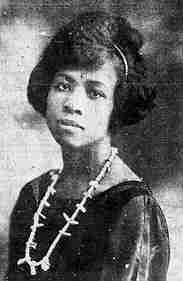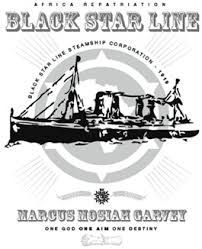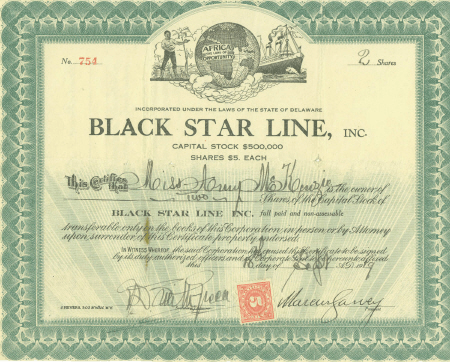Thank you Marcus Garvey
Thank you Marcus Garvey
The Black Star Line was the steamship company operated by Garvey and the Universal Negro Improvement Association (U.N.I.A) from 1919 to 1922. The Black Star Line was to be the U.N.I.A.'s vehicle for promoting worldwide commerce among black communities. In Garvey's vision, Black Star Line ships would transport manufactured goods, raw materials, and produce among black businesses in North America, the Caribbean, Africa and become the economic engine in a global black economy.
Garvey traveled throughout the United States speaking and meeting with African-American leaders. In the post World War I economic crisis and with racial discrimination, lynching and poor housing, the masses of Black people were ready for a leader who was aggressive and had a plan to uplift the race. The U.N.I.A. grew quickly. By 1919 there were over 30 branches throughout the United States, the Caribbean, Latin America and Africa. Garvey claimed over a million people had joined his organization in three years. In nine years Garvey built the largest mass movement of people of African descent in this country's history.
The Black Star Line
The Black Star Line
The Black Star Line was incorporated in Delaware on June 23, 1919 and was capitalized at a maximum of $500,000. Shares were valued at five dollars each and individuals could purchase a maximum of two hundred shares. Black Star Line stock was sold at U.N.I.A. meetings and conventions, by traveling agents, by mailed circulars and through advertisements in The Negro World newspaper.
The Model for Redemption 2019
Marcus Garvey had vision. It has been over 100 years since the creation of the Black Star Line and Garvey's effort to collectively finance an operation that would benefit blacks in America and throughout the world.
There has to be a high level of continuity from one generation to the next to increase the standard of living in our communities. We cannot continue to start from ground zero dealing with the same old problems as previous generations without an economic engine. As with any enterprise, it has to evolve and with the help of future generations that enterprise grows, diversifies and becomes a worldwide organization. Imagine if the Black Star Line had succeeded and eventually opened grocery stores, started a passenger cruise line, evolved into building automobiles, started a worldwide hotel chain and even owned sports franchises. The company today would be worth billions of dollars and employing hundred of thousands of individuals with good paying jobs. A purchase of $100 worth of stock in the 1920's may be worth millions of dollars today. Imagine how the company could have assisted families to have better choices with education, provide for quality housing, allow for quality health care, induce economic and political power to force politicians to address the needs of our communities. Imagine all of the job opportunities that would have been created from such an enterprise.
Multiple generations within one family could have been employed by such a business instilling much pride. Furthermore, it would have provided for tangible asset that could have been kept in the family and passed from generation to generation. Imagine how this one company could have changed our lives and the lives of our children – born or unborn. This happens everyday in America where one company creates generational wealth for many families. This can only come from a pattern of continuity. Don't you think that after 400 years it is about time that we reaped such reward? Let's leave a powerful economic engine for future generations so that they may compete effectively in the global marketplace and crush racism.
This is the time that the Black community unite and pool our resources for a cause bigger than ourselves. In the spirit of Marcus Garvey and others, we must create an economic engine that works to benefit Black people in America and throughout the entire world that will ultimately lead to our Redemption.
“If we as a people realized the greatness from which we came we would be less likely to disrespect ourselves.”
The Honorable Marcus Garvey
“A people without the knowledge of their past history, origin and culture is like a tree without roots.”
The Honorable Marcus Garvey




